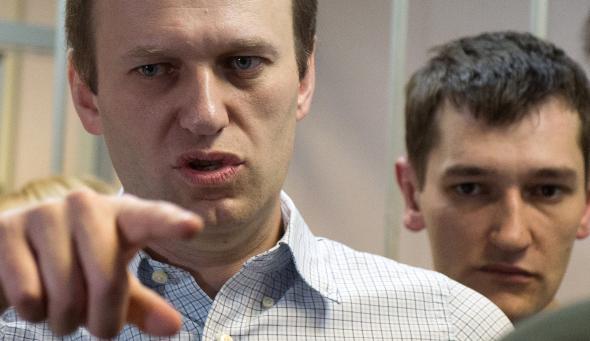Vladimir Putin’s government, often praised by both its defenders and its enemies for its toughness and decisiveness, rarely seems more vexed and uncertain than when dealing with opposition leader Alexei Navalny.
Monday, in a surprising move, a Moscow court suspended Navalny’s three-and-a-half-year sentence on fraud charges that were widely seen as a laughably trumped-up pretext to punish him for his outspoken opposition to the Russian government. This isn’t the first time Navalny had gotten off with a warning: In July 2013 he was freed on bail after receiving a five-year sentence for embezzlement that prompted massive street protests by his supporters in Moscow. This time, however, the court didn’t just let Navalny go; it jailed his brother Oleg, a former postal worker, instead. Not only is the Russian criminal justice system blatantly being used to punish the Kremlin’s critics; courts are now apparently willing to take family members as hostages to get the point across. (The brothers are alleged to have masterminded a plot to overcharge a subsidiary of the cosmetics brand Yves Rocher for its shipping to Russia, though the French company never issued a complaint.)
If the intent in letting Navalny out but jailing his brother was to keep Navalny under control without turning him into a martyr, it appears to have backfired. Hundreds of demonstrators gathered despite freezing temperatures to protest Oleg’s fate in Moscow’s Manezh Square, including Navalny himself, who showed up in violation of his house arrest from his earlier conviction, apparently still wearing his court-ordered ankle bracelet, and was quickly rearrested along with more than 100 others. The demonstrators were also met by a large crowd of counterdemonstrators, who accused Navalny’s supporters of trying to turn Manezh into a “Maidan”—a reference to the “Euromaidan” protests that toppled Ukraine’s Russian-backed government in February. Even dissident performance artists Pussy Riot, who seem to have given up their DIY punk rock aesthetic for perfume-commercial glam, released a new video for the occasion in support of Navalny.
What is it about this 38-year-old lawyer that has given Russia’s recently lackluster protest movement a spark, and Russia’s leaders, normally master manipulators of public opinion, such a headache? Navalny first gained a following as an online muckraker, exposing corrupt officials and business leaders on his popular LiveJournal blog. In addition to his painstaking probes into powerful interests including major oil companies and ministries, he distinguished himself by being blunt. (His description of the ruling United Russia party as the “party of crooks and thieves” in 2010 became a rallying cry for the anti-Putin opposition.) When major street protests broke out in late 2011 after disputed parliamentary elections, Navalny emerged as the most visible head of the movement, organizing the marches and earning rapturous applause for speeches blasting Putin.
In 2012 the Russian opposition overwhelmingly elected him leader in an informal online poll. Last year he ran against a Kremlin-backed candidate for mayor of Moscow, earning an impressive 27 percent of the vote. A poll last year showed him with a nationwide name recognition of 37 percent, huge given the government’s tight control over the news media.
Navalny describes himself as a nationalist democrat, and his ideology can be a bit difficult to place, beyond being anti-Putin. Though he has earned comparisons in the international media to figures ranging from Julian Assange to Nelson Mandela, there’s a bit of Pat Buchanan mixed in there as well. Navalny has called for Russia’s liberal opposition to unite with far-left and far-right groups who share an antipathy to Putin but have very different ideas about who or what should replace him. He has unapologetically appeared at rallies with ultranationalist, xenophobic groups. He was expelled from Russia’s largest liberal party, Yabloko, over his nationalist ties in 2007. Fellow members of the opposition have also accused him of intolerance to criticism and compared his occasionally hectoring, macho tone to that of Putin himself.
But the fact that Navalny is difficult to pigeonhole is probably a large part of his appeal: He’s a street activist and a savvy political campaigner at the same time and is just as comfortable talking to Russian nationalists as with readers of the New York Times. He’s certainly a far more dynamic figure than most of the intellectuals, spurned ex-politicians, and oligarchs who have dominated the leadership of the marginalized Russian opposition in the Putin era.
Still, Navalny has a long way to go if he hopes to grab more than headlines. Navalny’s case has rallied his base—mainly educated, middle-class urbanites—to come out in the cold, but opposition to Putin is still a niche issue for most Russians and despite this month’s currency collapse, the president is still overwhelmingly popular nationwide. Navalny’s following is an irritation for the government, and it will be interesting to see what they do with him now that it’s clear he’s not going to stay quiet to protect himself and his brother. But the government has survived rounds of Moscow street protests before and will likely weather this storm as well.
The bigger question going forward is whether Russians will begin to blame Putin’s policies for the slumping economy and rising consumer prices. Based on recent experience, it’s far from clear that they will. But if Russians do start to turn on Putin, Navalny is certainly the opposition figure in the best position to capitalize. And so far, the authorities have been surprisingly incapable of shutting him down. Monday’s arrest did not help that cause.
